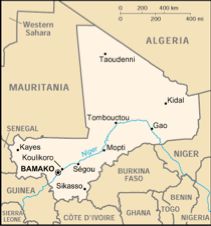This one is special.....
Katie Christ and Paul Laris were both Peace Corps volunteers in Mali, West Africa two decades ago.
They both believe in the power of a basic education and also believe in giving back. They co-founded Mali Kalanso, an all volunteer organization dedicated to building a pre-school, primary school, training teachers and providing adult literacy training in the village in which they worked over twenty years ago. They have raised the funds and the project is well under way.
Opportunity for All was honored to have the chance to provide a matching grant to help this dynamic duo in their efforts.
Check out their incredibly informative website here:
Mali Kalanso
They both believe in the power of a basic education and also believe in giving back. They co-founded Mali Kalanso, an all volunteer organization dedicated to building a pre-school, primary school, training teachers and providing adult literacy training in the village in which they worked over twenty years ago. They have raised the funds and the project is well under way.
Opportunity for All was honored to have the chance to provide a matching grant to help this dynamic duo in their efforts.
Check out their incredibly informative website here:
Mali Kalanso

Opportunity For All's Al O'Connor and Anne Studbaker with Mali Kalanso's co-founder, Katie Christ (center)
The Primary School is complete!
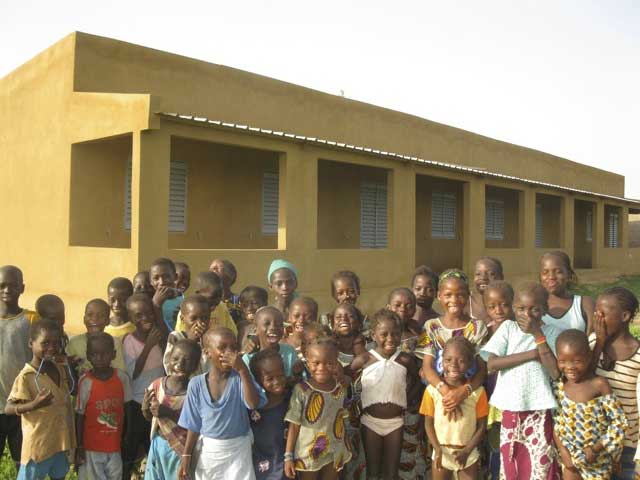
The new primary school and some of its excited students!
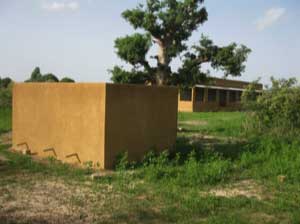
View of the school & the new latrine

Inside a classroom
On August 4, 2011 we received word from Katie Christ that construction on the primary school in Nienebale, Mali is complete. Katie writes:
We're now on to equipping the school, working with local gov't officials on executing their part (hiring teachers, teacher training, etc) and orienting the Peace Corps volunteer who has been placed in Nienebale as of a few weeks ago.
The academic year starts the first week of October 2011 and we are on track to begin classes as scheduled!
We've still got a few other things we're working on for the next phase, like the construction of a clean water hand pump to serve the school and setting up a girls' scholarship program. But I wanted to take a moment to savor this tremendous accomplishment!
It's been thrilling for me to see these photos and I hope it is for you too.
Thank you for your generosity and support in making this school a reality. The villagers are so excited and proud to have their own school. It will forever change the landscape of their lives.
With tremendous gratitude and all my very best wishes,
Katie
Nienebale Community Profile
Nienebale is located in the Koulikoro region in Mali. The current population of the community is 1067 people, living in 44 family groups. All of these people belong to either the Bambara or the Fulani ethnic group, and most practice either Islam or Christianity. The community is lead by the village chief, the Imam and Christian leader, the women’s representative, the youth representative and the community secretary. Nienebale is about 230 km from the buildOn office in Bougouni and 70 km from the capital, Bamako.
Most families in Nienebale are subsistence farmers, livestock keepers and gardeners. They grow millet, peanuts, beans, rice, onions, tomatoes, peppers, cabbage, lettuce, eggplant and more. Some people are also beekeepers and produce honey to eat and sell. Since Nienebale is located on the banks of the Niger River, some people are able to extract sand and gravel to sell as well.
Most families in Nienebale are subsistence farmers, livestock keepers and gardeners. They grow millet, peanuts, beans, rice, onions, tomatoes, peppers, cabbage, lettuce, eggplant and more. Some people are also beekeepers and produce honey to eat and sell. Since Nienebale is located on the banks of the Niger River, some people are able to extract sand and gravel to sell as well.
Current School Conditions
As there is just one classroom in Nienebale currently, there are only 72 students (40 girls and 32 boys) enrolled in school there. This classroom is not a formal elementary school, but is an alternative short-term (three year) government program for children unable to attend school. This three year program teaches basic literacy and math skills so that these children have the opportunity to procure a job that requires these skills and/or attend a vocational school. Other students walk to Gouni (7km away) or Diarrabougou (7km away) or cross the river to Koulikoro (10km away) to attend classes. buildOn fully expects the enrollment in Nienebale to grow when the new school is completed and additional teachers are available to teach more grade levels in the community. The teacher at the current Nienebale school is from a town 40km away and lives in the village weekdays during the school year. He told a buildOn Field Coordinator:
“My wish is that all the school age kids, boys and girls of this village and even the neighboring villages, will be able to get an education at this school.”
- Sekouba Koumare, teacher, 42 years old
“My wish is that all the school age kids, boys and girls of this village and even the neighboring villages, will be able to get an education at this school.”
- Sekouba Koumare, teacher, 42 years old
Nienebale was chosen as a buildOn project site after Katie Christ, a Peace Corps volunteer who lived there for 2 years, contacted buildOn and raised the money for a school. Nienebale’s new school block will be constructed of concrete reinforced mud bricks, with a poured concreted floor and a corrugated tin roof. The finished school will have 3 classrooms for grades 1-6 and 2 latrines, and will be completed in July 2011.
Nienebale Community Profile
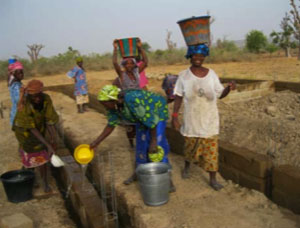
Women Watering the Foundation
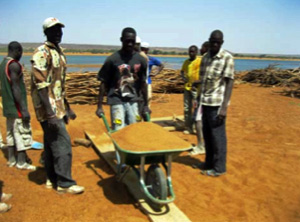
Collecting Sand From the River
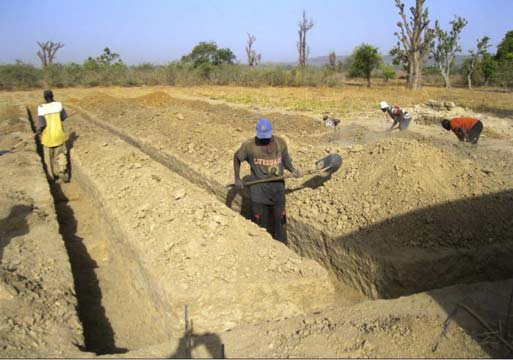
Digging the foundation trenches
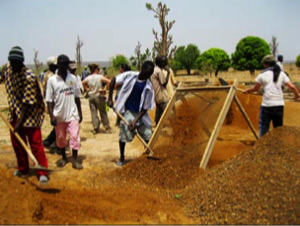
Sifting sand for cinderblocks
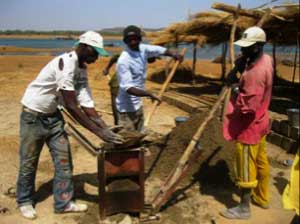
Skilled laborers molding cinderblocks
Education is important because it opens opportunities to a brighter future not only for the educated person, but also his family and the community he or she comes from. Educations means light, knowledge, self reliance and development.
Siaka Traore, chief of Nienabale, 56 years old
I will help build this school because it is the best gift we kids have ever had and I would like to attend class in this school. It will give us the chance to go to school in our own village, close to our parents.
Bambino Traore, student, 10 years old
This project broke ground on March 22nd, 2011 with the help of a Trek for Knowledge team of high school students from buildOn’s after-school program in California. These students were chosen from 8 different high schools and earned the opportunity to participate in the Trek after doing extensive local community service with buildOn. In Nienabale they lived with host families, participated in cultural workshops, and worked side by side with community members for 10 days on the worksite. Per buildOn methodology, they participated in the covenant signing ceremony with the community members and buildOn staff before breaking ground on the new school. This covenant outlines the plan for the project and the following commitments:
Community Contribution
• Unskilled labor: 30 workers (15 women and 15 men) per day, six days per week
• Commitment to educating girls and boys equally
• The land on which the school is built
• High quality local materials: sand, gravel, water & rocks
• Volunteer management committee made up of 12 villagers (six women, six men)
• Lodging for buildOn Field Coordinator and skilled laborers in local homes
• Basic construction tools (picks, buckets, etc.)
buildOn Contribution
• Architecture and Engineering
• Construction materials (excluding local materials) for school and latrine
• Skilled labor and plans needed to build the school
• Project management (buildOn coordinators)
• Instruction in basic construction techniques
Community Contribution
• Unskilled labor: 30 workers (15 women and 15 men) per day, six days per week
• Commitment to educating girls and boys equally
• The land on which the school is built
• High quality local materials: sand, gravel, water & rocks
• Volunteer management committee made up of 12 villagers (six women, six men)
• Lodging for buildOn Field Coordinator and skilled laborers in local homes
• Basic construction tools (picks, buckets, etc.)
buildOn Contribution
• Architecture and Engineering
• Construction materials (excluding local materials) for school and latrine
• Skilled labor and plans needed to build the school
• Project management (buildOn coordinators)
• Instruction in basic construction techniques
